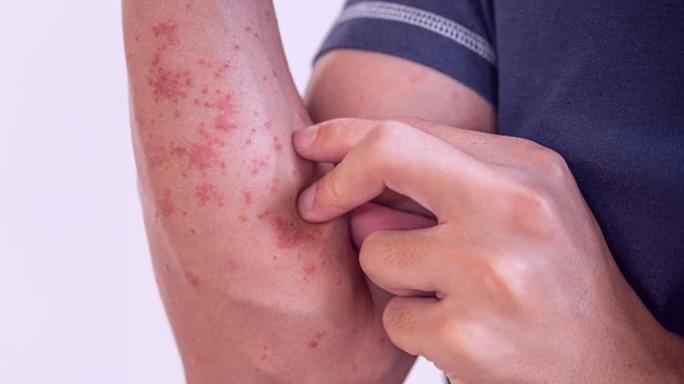
Atopic Dermatitis: the basics
Let’s face it – Atopic Dermatitis isn’t the easiest thing to understand, even if you’ve lived with it for years. So here’s an outline of what it is, and what makes it different from other types of eczema.
What causes Atopic Dermatitis?
Ever wondered what causes your Atopic Dermatitis? Well, the immune system plays a big role. Let’s take a look at how, as person with AD, yours works a little differently.1,2

So, what’s happening in your immune system?
The immune system is our body’s natural defence, but AD causes yours to be overactive.1 It’s normal for the immune system to respond to threats, like bacteria and viruses, with inflammation.3 This is how the immune system protects the body.
But as a person with AD or eczema, your immune system thinks that some substances, called allergens, are a threat too.3 This means you experience more inflammation than a person without AD.3
The other causes of Atopic Dermatitis
You’ve learned about the immune system, but there are other factors that can also play a role in your AD:2,3

Atopic Dermatitis is a type of Eczema
Eczema is a common term that people use for different skin conditions.1
But it’s not a catch-all.
According to the National Eczema Association, there are seven different types of eczema.1 Getting to know them can help you better understand your symptoms, what causes them, and the best way to treat them.
The symptoms of your AD often overlap with other forms of eczema, so it may be tricky to tell which one you have. Consult your dermatologist for more details on your condition.

Symptoms
If you live with Atopic Dermatitis or eczema, you may have to deal with a lot of symptoms. You’re probably familiar with your symptoms already and one thing’s for sure – they can get in the way.
Your symptoms shouldn’t hold you back
Whichever symptoms you experience, and however they appear, you should discuss them with your doctor. Be open and honest during your appointments. Your doctor needs a clear picture of your condition, so they can help you find the long-term control you deserve.
Severity
Getting to know the severity of your Atopic Dermatitis, getting a sense of how severe your Atopic Dermatitis is can be helpful for doctors. But it can be a difficult thing to judge on your own. Don’t worry though – that’s where your dermatologist can help.
How is it measured?
Dermatologists split AD into three categories of severity: mild, moderate, and severe.
The severity of your AD can be measured in different ways, including how widespread your lesions are, where they’re located, how intense your itch is, and how much the condition impacts your quality of life.1,2
AD is a chronic, relapsing condition, which means that your symptoms will usually fluctuate over time.3
As your symptoms change, so can your treatment needs. That’s why it’s important to keep an eye on your symptoms and discuss any changes with your dermatologist.

Talking severity in appointments
It’s entirely possible that you won’t be having a flare-up during your doctor’s appointment. In fact, you might be feeling okay. But it’s important to give your dermatologist a true picture of your symptoms. Here are some questions to consider:
- Where do your AD rashes or lesions appear? How much of your skin do they cover?
- How intense is your itch? When do you experience it the most?
- How do your symptoms impact your life?
- Do they affect your sleep? Social life? Productivity? Relationships?
Answering these will help your doctor understand the real severity of your AD, which can help ensure they’re managing your condition in the most effective way.

What you can do now
Take pictures of your flares when they happen. That way, you can show your doctor exactly what your symptoms look like in your next appointment.
Use the Atopic Dermatitis Control Tool. This is a recognised way for dermatologists to assess how controlled or uncontrolled your AD is. Once you’ve completed the test (six questions), you can show the result to your dermatologist, who may use it to guide their next treatment decision.

However severe your AD is, just remember - Speak to a dermatologist about your AD severity and how you can manage it for the long term.
References:
- National Eczema Association. Atopic Dermatitis. Available at: https://nationaleczema.org/eczema/types-of-eczema/atopic-dermatitis/. Accessed December 2023.
- AAAAI. Atopy Defined. Available at: https://www.aaaai.org/tools-for-the-public/allergy,-asthma-immunology-glossary/atopy-defined/. December 2023.
- National Eczema Association. Understanding inflammation’s role in atopic dermatitis. Available at: https://nationaleczema.org/inflammation-atopic/. Accessed December 2023.
- National Eczema Association. What is Eczema. Available at: https://nationaleczema.org/eczema/. Accessed December 2023.
- Merriam-Webster. Systemic. Available at: https://www.merriam-webster.com/dictionary/systemic. Accessed December 2023.
- Bieber T. Ann Dermatol 2010; 22:125–137.
- NHS. Atopic eczema overview. Available at: https://www.nhs.uk/conditions/atopic-eczema/. Accessed December 2023.
- AAAAI. Atopic Dermatitis Defined. Available at: https://www.aaaai.org/tools-for-the-public/allergy,-asthma-immunology-glossary/atopic-dermatitis-defined/. Accessed: December 2023.
- Merriam-Webster. Dermatitis. Available at: https://www.merriam-webster.com/dictionary/dermatitis/. Accessed December 2023.
- NHS. Atopic eczema causes. Available at: https://www.nhs.uk/conditions/atopic-eczema/causes/. Accessed December 2023.
- Leung DYM et al. J Clin Invest 2004; 113:651–657.
- Gittler JK et al. J Allergy Clin Immunol 2012; 130:1344–1354.
- Kaufman BP et al. Exp Dermatol 2018; 27(4):340–357.
- Zuberbier T et al. J Allergy Clin Immunol 2006; 118(1):226–232.
- Weidinger S et al. Lancet 2016; 387:1109–1122.
Issued in public interest by : Sanofi Healthcare India Pvt. Ltd.
MAT-IN-2400049-0.1-01/24
